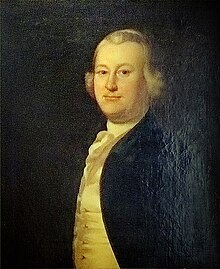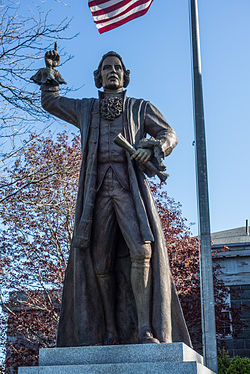James Otis | |
|---|---|
 Portrait by Joseph Blackburn, 1755 | |
| Born | February 5, 1725 Barnstable, Massachusetts Bay, British America |
| Died | May 23, 1783 (aged 58) |
| Resting place | Granary Burying Ground, Boston |
| Occupation(s) | lawyer, political activist, pamphleteer, and legislator |
| Known for | Oration against British writs of assistance February 5, 1761, which catapulted him into the first rank of Patriot leaders |
| Spouse |
Ruth Cunningham (m. 1755) |
| Children | James, Elizabeth Brown Mary Lincoln |
| Parent(s) | James Otis Sr. Mary Allyne |
| Relatives | Otis family |
| Signature | |

James Otis Jr. (February 5, 1725 – May 23, 1783) was an American lawyer, political activist, colonial legislator, and early supporter of patriotic causes in Massachusetts Bay Colony at the beginning of the Revolutionary Era. Otis was a fervent opponent of the writs of assistance imposed by Great Britain on the American colonies in the early 1760s which allowed law enforcement officials to search private property without cause. He later expanded his criticism of British authority to include tax measures that were being enacted by Parliament. As a result, Otis is often credited with coining the slogan "taxation without representation is tyranny".[1][2]
Otis was a mentor to Samuel Adams, and his oratorical style inspired John Adams. He is recognized by some as a Founding Father due to his efforts leading up to the Revolutionary War.[3] However, Otis was plagued by mental illness and alcoholism, and his erratic behavior had rendered him inconsequential and embarrassing to the cause by the early 1770s.[4][5]
- ^ McCullough, David (2001). John Adams. New York: Simon & Schuster. pp. 61. ISBN 978-0-7432-2313-3.
- ^ "The radicalism of the American Revolution – and its lessons for today". July 3, 2020.
- ^ Kann, Mark E. (1999). The Gendering of American Politics: Founding Mothers, Founding Fathers, and Political Patriarchy. ABC-CLIO. p. xi. ISBN 978-0-275-96112-1.
- ^ Bowman, John Stewart (2005). The Founding Fathers: The Men Behind the Nation. North Deighton, Massachusetts: World Publications Group, Inc. pp. 22–25. ISBN 1572154365.
- ^ Trickey, Erick (May 5, 2017). "Why the Colonies' Most Galvanizing Patriot Never Became a Founding Father". Smithsonian Magazine. Retrieved September 29, 2022.